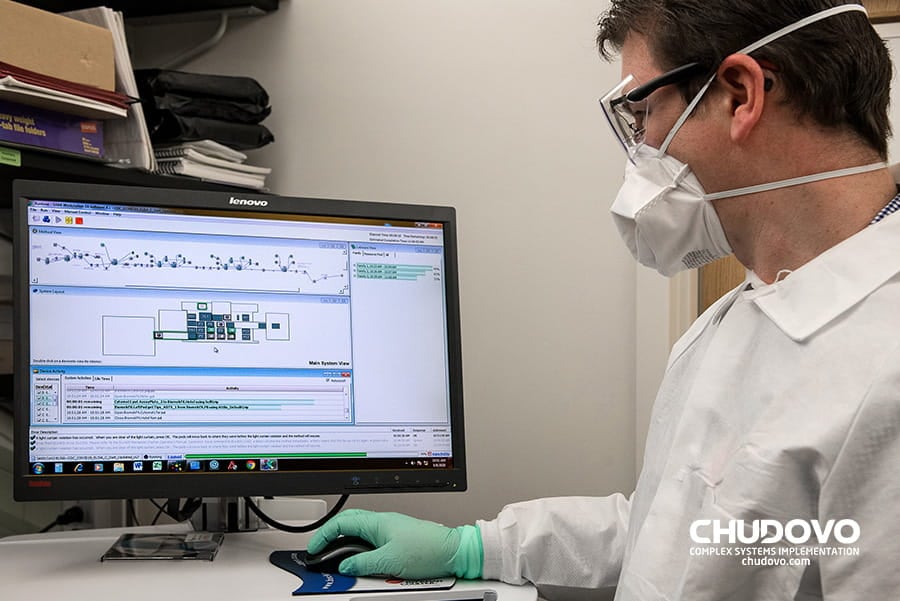
Streamlining Hospital Administration: How Hospital Management Software Can Help
In April 2020, McKinsey reported an unprecedented surge in telehealth usage, with a 78-fold increase compared to pre-COVID-19 levels. The media was filled with stories of people waiting in long hospital queues, patients being treated in hospital corridors, and even some who passed away while waiting for a hospital bed. It was a heartbreaking sight to behold. New analysis has shown that telehealth use has increased since the pre- covid 19 baseline.
The world’s healthcare systems have experienced many jeopardies since the Covid-19 era, and patient care has been imperiled. This made many healthcare systems and organizations to invest wholly in hospital management systems and decide to go for virtualized care.
Hospitals are complex organizations requiring efficient management to ensure the best possible patient care. Hospital management software is a powerful tool that can help streamline operations, improve patient care, and increase efficiency. And in this article, we will provide an overview of hospital management systems, their features, benefits, and how to implement them.
Table of content

Overview of Hospital Management Software
If you have visited the hospital during the covid-19 era or even recently. Do you still remember the experience?
You probably booked an appointment beforehand or booked online any process you did. You entered your name, address, phone number, date of birth, insurance, etc. This whole process is called the hospital management system.
A hospital management system is a tool that is used in managing all the aspects of a hospital’s operations, from patients’ personal information to medical, financial, administrative, legal, and compliance details in one software. The most significant advantage of using the HMS in a hospital or organization is that it makes the process paperless, from fixing an appointment to seeing the doctor.
Aside from data processing, hospital management software is a comprehensive system designed to help hospitals manage their operations more efficiently. It can help automate and streamline processes such as patient registration, billing, scheduling, and medical records.
Additionally, it can also provide real-time analytics and reporting, allowing hospitals to make informed decisions quickly. Hospital management software can help improve patient care by providing access to medical records, appointment reminders, and other patient-centric features.
Features of Hospital Management Systems
The features of hospital management software can matter depending on the provider in an organization. Here’s a list of features of hospital management software for patients, hospitals, and doctors.
Features For Patients
- Patient registration and scheduling
- Electronic medical records
- Billing and invoicing
- Appointment reminders
- Real-time analytics and reporting
- Patient portal
- Drug inventory management
- Clinical decision support
- Automated workflow management
- Automated patient communication
- Online appointment booking
- Online payment processing
- Telemedicine
- Patient education resources
- Patient satisfaction surveys
- Automated appointment reminders
- Automated medication reminders
- Automated lab results notifications
- Automated follow-up reminders
Features For Hospitals
- Automated workflow management
- Automated patient communication
- Automated billing and invoicing
- Automated appointment scheduling
- Automated drug inventory management
- Automated clinical decision support
- Automated lab results notifications
- Automated follow-up reminders
- Automated patient satisfaction surveys
- Automated patient education resources
- Automated patient check-in
- Automated patient discharge
- Automated patient transfer
- Automated patient waitlist management
- Automated patient wait time tracking
- Automated patient flow tracking
- Automated patient safety alerts
- Automated patient care reminders
- Automated patient care coordination
- Automated patient care documentation
Features For Doctors
- Calendar with appointment
- Manage patients
- Logs from patients
- Patient’s care team
- Treatment history
- Notes about patients
- Patients card
- Missed messages
- Profile
- Telemedicine solution(video chat)

Types of Hospital Management Systems
Before developing a hospital management system, it is essential to decide on the type that best suits the hospital’s needs. There are five types of hospital management systems available, each of which is responsible for different parts of the hospital workflow and automates different tasks.
Each type of HMS has its advantages and disadvantages, so it is essential to carefully consider the hospital’s needs before making a decision. These include:
- Cloud-based systems
- On-premise systems
- Hybrid systems
- Mobile systems
- Web-based systems
We have other types of hospital management systems like operational, administrative, subject-based, text-based, and billing, but in this article, we will be talking about the five types listed above.
Cloud-based system
Cloud-based hospital management systems are hosted on the cloud and provide access to data and applications from any device with an internet connection. This type of system is ideal for hospitals that need to access data and applications from multiple locations or devices.
Additionally, cloud-based systems are typically more cost-effective than on-premise systems, as they do not require the purchase of hardware or software. However, cloud-based systems may require additional security measures to protect sensitive data.
On-premise system
On-premise hospital management systems are installed on the hospital’s servers and provide access to data and applications from within the hospital’s network. This type of system is ideal for hospitals that need to maintain control over their data and applications, as they are not reliant on an external provider.
Generally, on-premise systems can be customized to meet the hospital’s specific needs. The downside is that on-premise systems require the purchase of hardware and software and may require additional maintenance and support.
Hybrid system
Hybrid hospital management systems combine the features of both cloud-based and on-premise systems, allowing hospitals to access data and applications from both the cloud and their servers. This type of system is ideal for hospitals that need the flexibility of cloud-based systems but also need to maintain control over their data and applications.
Hybrid systems can be customized to meet the specific needs of the hospital. However, hybrid systems may require additional security measures to protect sensitive data.
Mobile system
Mobile hospital management systems are designed for mobile devices such as smartphones and tablets. This type of system is ideal for hospitals that need to access data and applications from multiple locations or devices. In addition, mobile systems are typically more cost-effective than on-premise systems, as they do not require the purchase of hardware or software.
Web-based systems
Web-based hospital management systems are designed to be used on web browsers. This type of system is ideal for hospitals that need to access data and applications from multiple locations or devices. Additionally, web-based systems are typically more cost-effective than on-premise systems, as they do not require the purchase of hardware or software.
Benefits of hospital management software
Here are the top benefits of developing hospital management software for your organization:
Improved patient care
This is achieved by automating tasks such as patient check-in, discharge, transfer, and waitlist management. Automating these tasks helps to streamline the patient care process, reduce wait times, and improve the overall patient experience. Additionally, automated patient notes, patient history tracking, and care plan help ensure patients receive the best possible care.
Increased efficiency
Automating tasks such as patient wait for time tracking, patient flow tracking, and patient safety alerts. Automating these tasks helps to reduce wait times, improve patient flow, and ensure that patient safety is maintained.
Better communication between hospitals department
A hospital has no place for mistakes or late responses. With a hospital management system, you can store all information, from analysis results to pharmacy inventory, patient care reminders, coordination, and documentation. Automating these tasks helps to ensure that all departments are kept up to date on patient care plans, patient progress, and any changes in patient care. Additionally, automated patient notes, patient history tracking, and patient care plan help to ensure that all departments are kept informed of any changes in patient care.
Improved patient safety
The use of medication alerts, clinical flags and reminders, better tracking and reporting of consultations and diagnostic testing, clinical decision support, and the availability of complete patient data can help to improve patient safety. These tools can help to alert healthcare providers of any changes in patient care, coordinate care with other healthcare providers, track patient progress, and ensure that patients receive the best possible care in the safest manner.
Cost savings
Automating these tasks helps to reduce wait times, improve patient flow, and ensure that patient safety is maintained. Additionally, automated patient notes, patient history tracking, and patient care plan help to reduce costs associated with manual data entry and ensure that patients receive the best possible care in the most cost-effective manner.
Simplified Hospital Workflow
Waiting in queues at hospitals is a common occurrence. If you arrive at the hospital and other patients were late to their appointment, you might have to wait 30 minutes or more for the consultation to be over.
With the implementation of a hospital management system, patients can easily reschedule or cancel appointments, and the relevant doctor’s schedule is updated in real-time. Doctors can quickly update patient histories, add or remove symptoms, and change medication lists, and this information is automatically updated for patients.
Hospital management systems (HMS) help to speed up many hospital processes, improving the workflow for both patients and doctors. Simplified hospital workflow can be achieved by automating tasks such as patient check-in, patient discharge, patient transfer, and patient waitlist management.
Automating these tasks helps to streamline the patient care process, reduce wait times, and improve the overall patient experience. Additionally, automated patient notes, patient history tracking, and patient care plan help to ensure that all departments are kept up to date on patient care plans, patient progress, and any changes in patient care.
Structured Data on Staff Performance
Developing a hospital management system provides the benefit of performance management. HMS tracks the performance of hospital staff, allowing hospital administration to receive detailed reports and identify which types of hospital services are more profitable and which departments are less productive. This data can be used to inform decision-making and help protect both finances and reputation.
Structured data on staff performance can be collected and analyzed using hospital management systems. This data can be used to track staff performance, identify areas of improvement, and measure the effectiveness of staff training. Additionally, this data can be used to identify trends in patient care, such as wait times, patient satisfaction, and patient outcomes. By collecting and analyzing this data, hospitals can ensure that their staff provides the best possible care to their patients.

How to Build a Hospital Management Software
The development of a hospital management system in a hospital takes only six keys, and there are:
Step 1 – Market discovery
Discovering your market is the first thing that should be done. You must research your niche, analyze your competitors, check what they are doing, identify their strengths and weaknesses, and determine how to differentiate your product. This will help you to create a software solution that meets the needs of hospitals and stands out from the competition.
Step 2 – User Research
Once you have completed your market analysis, the next step is to conduct user research. There are various methods for studying your audience, such as interviews, surveys, and focus groups. It is vital to choose the method that best suits your project to gain a comprehensive understanding of the needs and preferences of your users.
Step 3 – Determine your best combination
After completing market analysis and user research, you will have a clear understanding of the functional requirements for your hospital management system (HMS) project. The final step is to determine the best combination of HMS types that will satisfy these requirements. This will ensure that your HMS project meets the needs of your users and provides the best possible experience.
Step 4 – Create a detailed software design plan
Create a detailed plan for the software’s design. Design plays a crucial role in the success of a hospital management application. It should be intuitive and friendly, as people often come to hospitals under stress or other negative emotions.
The design should be easy to navigate and lead users to their desired endpoint smoothly. Additionally, the design should be visually appealing and engaging to ensure that users have a positive experience.
Step 5 – Develop your minimum viable product
Creating a hospital management software that solves a problem can be achieved by starting with a Minimum Viable Product (MVP). An MVP allows you to validate your idea quickly and cheaply, get feedback from real users, and provide proof that your idea works for stakeholders and investors. However, it is important to note that an MVP should only include the essential features and that the product must adhere to all HIPAA regulations.
Step 6 – Product launch
Once your Minimum Viable Product (MVP) is ready, it is time to launch the product to the market. This is the most exciting part, as you can observe how users interact with your product. You should pay attention to whether the hospital management system is too complicated for doctors to use, if there is enough functionality for patients, and if any other areas need improvement. Based on this feedback, you can communicate new requirements to your team, implement changes, and test the software to ensure that it meets the needs of your users.
How Do You Implement Hospital Management Software?
Implementing hospital management software requires careful planning and consideration. First, you should assess your current needs and determine which features are most important for your hospital. Then, you should research different software solutions and compare their features and pricing.
Once you have chosen a software solution, you should create a plan for implementation and training. Finally, you should monitor the software’s performance and make any necessary adjustments

Certified engineers
Convenient rates
Fast start
Profitable conditions
Agreement with
EU company
English and German
speaking engineers
Key Limitations of Hospital Management System
Before beginning the development of a hospital management system (HMS), it is crucial to consider the potential limitations that may arise.
- The complexity of hospital management software can vary depending on the features and functionality included. Generally, the more complex the software, the more difficult it is to use and maintain. Additionally, complex software can be more expensive to implement and may require more frequent updates to ensure compliance with regulations.
- The cost of implementing and maintaining a hospital management system can vary depending on the features and functionality included. Generally, more complex software will require more resources and may be more expensive to implement and maintain. Additionally, regular updates may be necessary to ensure compliance with regulations, which can also add to the cost.
- Regular updates to hospital management systems are necessary to ensure compliance with regulations. These updates may include changes to the software’s features and functionality, as well as security patches to protect patient information. Additionally, regular updates may be necessary to ensure the software is up-to-date with the latest technology and trends.
- The ability to handle large amounts of data is an essential factor when considering a hospital management system. The software must store and process large amounts of data quickly and securely to provide a positive user experience. Additionally, the software must be able to scale as the amount of data increases to ensure that the system remains efficient and reliable.
- The security of patient information is of utmost importance when considering a hospital management system. The software must protect patient information from unauthorized access and ensure that all data is stored securely. Additionally, the software must adhere to all relevant regulations, such as HIPAA, to ensure that patient information is kept confidential.
Conclusion
The Hospital Management System has become an essential part of any healthcare facility. Investing in a comprehensive HMS can help create a differentiated, efficient, speedy, and thoughtful healthcare model. With the right software, you can streamline processes, improve patient care, and ensure compliance with regulations.
The modern world requires digitalization in all aspects, and healthcare is no exception. Developing hospital management software projects is one way to ensure that healthcare facilities are up-to-date with the latest technology and trends. An HMS is a tool for collecting and managing all hospital data, making most of the hospital process paperless.
When creating an HMS, it is important to carefully choose the features for each user role to ensure that their needs are met. Additionally, data privacy is a major concern, so it is important to focus on implementing secure services in the HMS to protect users’ data. Finally, it is important to pay attention to the details and make the app tolerant and as neutral as possible to ensure a positive user experience.
FAQs
Why is a hospital management system required?
Hospital management systems are required to streamline processes, improve patient care, and ensure compliance with regulations. An HMS can help healthcare facilities stand out from the competition and provide a positive user experience. By using an HMS, healthcare facilities can reduce costs, improve efficiency, and provide better patient care.
What are the challenges in the hospital management system?
Digital transformation in healthcare can add additional pressure to healthcare professionals:
- Cybersecurity threat
- Complex interface
- Insecurity of job
- Lack of technical team support
What features should I look for in a hospital management system?
When considering a hospital management system, you should look for features such as scalability, data security, a user-friendly interface, and compliance with relevant regulations.
How can I ensure a positive user experience with my hospital management system?
To ensure a positive user experience with your hospital management system, you should focus on creating a user-friendly interface, providing regular training and support, and ensuring that the software complies with all relevant regulations and that data is stored securely. You should conduct market analysis and user research to ensure that your software meets the needs of your users and stands out from the competition.
How much does it cost to develop hospital management software?
The cost of developing hospital management software depends on the complexity of the project, the features and functionality required, and the development team. Generally, the cost of developing hospital management software can range from a few thousand dollars to tens of thousands of dollars. There may be ongoing costs associated with maintenance and updates. It is important to consider the long-term costs associated with developing and maintaining hospital management software, as well as the potential benefits of investing in a comprehensive system.
If you need highly qualified healthcare software developers at the right price for your project, contact us now!


